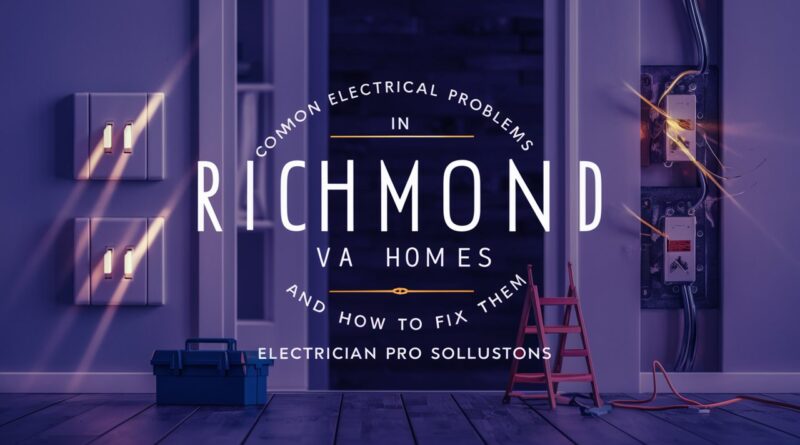Common Electrical Problems in Richmond VA Homes and How to Fix Them
In Richmond’s historic neighborhoods like Fan District and Church Hill, where many homes date back to the early 1900s, electrical issues aren’t just inconveniences – they’re potential safety hazards waiting to spark. From the charming row houses along Monument Avenue to the mid-century ranches in Westover Hills, each home tells its own electrical story. As Richmond’s housing stock ages and our reliance on modern electronics grows, understanding these common electrical problems becomes crucial for every homeowner.
Power Surges and Sags: The Richmond Grid Challenge
Richmond’s frequent summer thunderstorms and aging power infrastructure create the perfect storm for electrical surges and power sags. These voltage fluctuations can wreak havoc on your expensive electronics and appliances. While lightning strikes are obvious culprits, many homeowners don’t realize that faulty appliances or damaged power lines can also trigger surges.
To protect your home, start with quality surge protectors for valuable electronics. However, for comprehensive protection, consider installing a whole-home surge protection system. This investment, typically ranging from $200-500 when installed by a qualified electrician Richmond VA, can save thousands in potential damage. For persistent power sags that dim your lights, the solution might be as simple as redistributing power usage across different circuits or as complex as upgrading your electrical panel—a job best left to professional electrical contractors in Richmond VA.
The Circuit Breaker Crisis: Understanding Overloads
If you’re constantly playing “find the tripped breaker” in your home, you’re not alone. Richmond’s older homes weren’t designed for today’s electrical demands. A single circuit in a historic Fan District home might be trying to power multiple air conditioners, computers, and modern appliances—a recipe for frequent breaker trips.
The fix starts with understanding your home’s electrical capacity. Map out which appliances are connected to each circuit and redistribute the load where possible. Warning signs like warm outlets or burning smells require immediate attention from a licensed electrician. While resetting a breaker is safe DIY territory, any electrical panel work should be handled by professional Richmond VA electrical contractors. Consider upgrading to a modern 200-amp service if you’re still running on an older 100-amp panel—especially if you’re planning to add more electrical devices or appliances.
Dead Outlets and Dying Bulbs: More Than Just Annoyances
When outlets stop working or light bulbs burn out frequently in Richmond homes, it’s often a symptom of deeper electrical issues. In historic districts like Oregon Hill, where knob-and-tube wiring might still lurk behind walls, these problems can indicate serious safety concerns.
Start troubleshooting by checking for tripped GFCI outlets (commonly found in kitchens and bathrooms) and testing circuit breakers. If bulbs are burning out quickly, ensure you’re using the correct wattage and check for signs of loose connections. However, if you notice discolored outlets, hear buzzing sounds, or smell anything unusual, contact an electrical contractor in Richmond VA immediately. These could be signs of dangerous wiring issues that require professional attention.
Shock Hazards and Safety Concerns: Protecting Your Family
Electrical shocks from appliances or outlets, no matter how mild, should never be ignored. In Richmond’s older homes, especially those that have undergone multiple renovations, improper grounding is a common culprit. The humid Richmond summers can also contribute to moisture-related electrical hazards.
While homeowners can perform basic safety checks—like testing GFCI outlets monthly and keeping electrical panels clear—any shock-related issues demand professional intervention. An experienced electrician in Richmond VA can assess your home’s grounding system, identify potential hazards, and implement necessary safety upgrades. Don’t wait for a serious incident; if you experience even minor shocks, call a professional immediately.
The Energy Efficiency Equation: Tackling High Electric Bills
Rising energy costs hit Richmond homeowners particularly hard during extreme weather months. While some increase is expected when running air conditioning in August or heating in January, unexpectedly high bills often signal electrical inefficiencies.
Start with a DIY energy audit: check for drafts, inspect insulation, and consider upgrading to LED bulbs. Smart thermostats and energy-monitoring devices can help identify power-hungry appliances. However, if your bills remain unusually high, faulty wiring might be the culprit. Professional energy audits can pinpoint less obvious issues, like outdated wiring or inefficient electrical systems that need upgrading.
Maintaining Your Home’s Electrical Health
Prevention is always cheaper than emergency repairs. Schedule annual electrical inspections, especially if your home is over 25 years old. Keep trees trimmed away from power lines, regularly test safety devices, and maintain a relationship with trusted Richmond VA electrical contractors.
Conclusion
When it comes to your Richmond home’s electrical system, cutting corners isn’t worth the risk. While this guide helps you identify common problems, proper diagnosis, and repair require professional expertise. Above the Code Electrical has been serving Richmond’s unique housing market for years, bringing specialized knowledge of everything from historic Fan District wiring to modern Smart home installations.
Our licensed electrical contractors Richmond VA understand that every Richmond home tells a different story. Whether you’re dealing with flickering lights in your Museum District Victorian or need a panel upgrade in your Westover Hills ranch, we provide tailored solutions that prioritize your family’s safety and comfort.
Frequently Asked Questions
Q: How often should I have my home’s electrical system inspected? A: Annual inspections are recommended for homes over 25 years old. Newer homes can typically go 3-5 years between inspections unless you notice problems.
Q: Is aluminum wiring dangerous? A: While not immediately dangerous if properly maintained, aluminum wiring (common in homes built 1965-1973) requires special attention and should be regularly inspected by a qualified electrician.
Q: Can I install a ceiling fan where a light fixture exists? A: While possible, this job requires checking the electrical box’s weight rating and often involves installing additional support. It’s best left to professionals.




